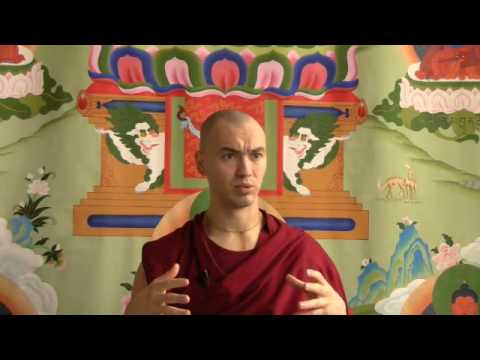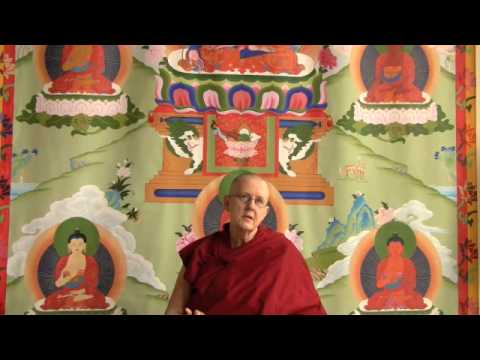Cultivating contentment
Part of a series of Bodhisattva's Breakfast Corner talks given during the Green Tara Winter Retreat from December 2009 to March 2010.
- We can learn to be satisfied with what we have
- Mindfulness and slowing down help us to find contentment
Green Tara Retreat 043: Contentment (download)
I just want to add on a little bit to what I said about learning to be dispassionate towards perception. I don’t know exactly why that word was used, but I guess it would be the same thing, because you perceive through your senses. Without senses you wouldn’t be able to perceive anything.
The question arises, “So, how do we do this? It sounds great and all, but how do we go about it?” I think the most important thing, at least in my experience, is to be content. To learn to have contentment with my situation, with what is happening in my mind, what is happening around me, with what food I’m eating, with everything—all of those things—just learning to be content. Just do that.
How do we be content? That is a big question too. I think this is where the teachings on mindfulness come in, and the teachings on introspective alertness, and slowing down—at looking at our experience. If we do that, we come to see that really we have everything that we need to be happy right now. We don’t need to gain anything else; it is all here. We don’t need anything external to be happy. If we slow down, and we are mindful, we can see that. This is actually the converse of what is quite visible in our society [today], where people are so discontented, and so unhappy, and also so very unaware of their current experience and mental state. It is all outward focus: move quickly, get as much as I can. There is very little happiness in that. You look around at the people who are mostly driven by their senses and they are really unhappy. At least, that has been my experience when I look around.
I think just really coming back to what Venerable Chodron says, “What I have is good enough; where I am is good enough; and what I am doing is good enough.” To really actually think those things and not just to be like, “Oh, well, it should be good enough, but I don’t feel that way.” Also, “Who I am is good enough.” To actually, and consciously, say to ourselves, “This is enough. This is okay. I will be okay with this. I will make it through this and I will be fine. I do not need any more. If I have more it is okay, but I do not need any more [than that], I’ll be just fine.” Continually turn the mind that way. Eventually, if you do this a couple times and then you get through the experience, you then realize, “Hey, I was right. I am just fine. It wasn’t a big deal.” It becomes kind of automatic. You say, “Well yes, it really is good enough; it is just fine. Everything is just fine. It is okay. This is not a problem.”
Then it is just natural, and contentment comes and we learn, automatically, dispassion towards the senses, towards perception. There is no need to get tied up in those things.
Thubten Jampel
Born in 1984, Carl Willmott III—now Thubten Jampel—came to the Abbey in May 2007. He met Venerable Chodron in 2006 while she was giving a teaching at Airway Heights Correction Center. He took refuge and the five precepts in August of 2007 after participating in Exploring Monastic Life, an annual program at Sravasti Abbey. He took the eight anagarika precepts in February of 2008 and ordained in September 2008. He has returned to lay life.


